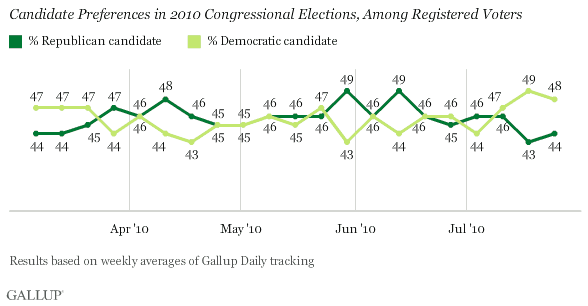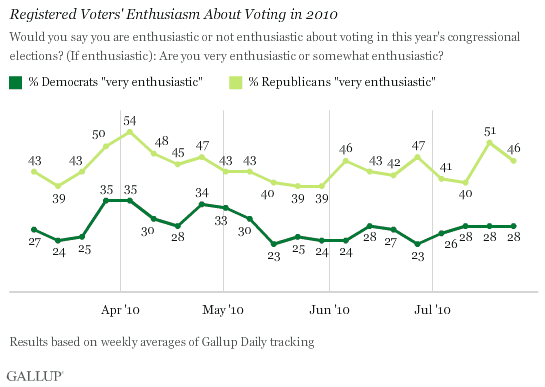PRINCETON, NJ -- Democrats have a 48% to 44% advantage for the week of July 19-25 in Gallup tracking of registered voters' preferences for the 2010 congressional elections. This marks the second straight week in which Democrats have held an edge of at least four percentage points.

Although Republicans have moved to a four-point or higher advantage on three separate occasions, this is the first time either party has held an advantage of that size for two consecutive weeks. Republicans and Democrats have been tied on average across the 21 weeks of Gallup's tracking.
Republicans' Enthusiasm Lead Persists
Republicans continue to be substantially more enthusiastic about voting, as they have been since March. Their current 18-point lead in voting enthusiasm is down slightly from last week's 23-point lead, but it remains slightly higher than the average 16-point lead they have enjoyed since tracking began in March.

Overall enthusiasm for voting was little changed last week. Thirty-four percent of registered voters say they are very enthusiastic about voting, compared with 36% a week prior and an average of 33% so far this year.
Bottom Line
This past week marks the second time since March that either party has held any type of edge on the generic ballot for three consecutive weeks. Exactly what is behind the uptick in support for Democrats is not clear, although last week's gains coincided with the passage of the financial reform bill. Independents continue to be more likely to say they will vote for the Republican rather than the Democratic candidate, while both Republicans and Democrats maintain more than 90% allegiance for their party's candidates.
Democrats' improved position on the generic ballot is counterbalanced by the continuing wide advantage Republicans have in voting enthusiasm. This GOP enthusiasm gap foreshadows a typical Republican turnout advantage in midterm election voting, meaning that Democrats need a substantial lead on the registered voter generic ballot to offset their turnout disadvantage. Still, the results show that expectations of an assured Republican landslide in the congressional elections this fall are not a foregone conclusion.
Gallup's final generic ballot measure, based on likely voters, has since 1950 closely matched the total percentage of votes cast nationally for Democratic and Republican candidates in all 435 U.S. House races -- a statistic that bears a predictable relationship to the number of House seats won by each party. Gallup does not screen for likely voters until closer to Election Day, but historically, Republicans' turnout advantage in midterm elections widens the Republican-Democrat gap in the GOP's favor. Thus, if these numbers held through Election Day, the two parties would likely be closely matched at the ballot box.
Survey Methods
Results are based on telephone interviews conducted as part of Gallup Daily tracking survey July 19-25, 2010, with a random sample of 1,633 registered voters, aged 18 and older, living in all 50 U.S. states and the District of Columbia, selected using random-digit-dial sampling.
For results based on the total sample of registered voters, one can say with 95% confidence that the maximum margin of sampling error is ±4 percentage points.
Interviews are conducted with respondents on landline telephones and cellular phones, with interviews conducted in Spanish for respondents who are primarily Spanish-speaking. Each daily sample includes a minimum quota of 150 cell phone respondents and 850 landline respondents, with additional minimum quotas among landline respondents for gender within region. Landline respondents are chosen at random within each household on the basis of which member had the most recent birthday.
Samples are weighted by gender, age, race, Hispanic ethnicity, education, region, adults in the household, cell phone-only status, cell phone-mostly status, and phone lines. Demographic weighting targets are based on the March 2009 Current Population Survey figures for the aged 18 and older non-institutionalized population living in U.S. telephone households. All reported margins of sampling error include the computed design effects for weighting and sample design.
In addition to sampling error, question wording and practical difficulties in conducting surveys can introduce error or bias into the findings of public opinion polls.
For more details on Gallup's polling methodology, visit https://www.gallup.com/.
